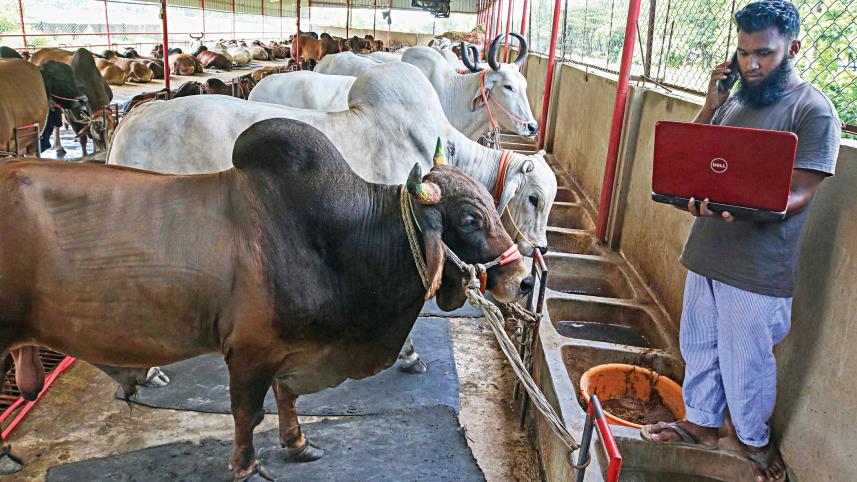Sylhet residents show the way

Though the district administration was planning to set up temporary cattle markets ahead of Eid in Sylhet, locals apparently are showing better judgement by purchasing sacrificial animals directly from farms after selecting cattle online to avoid crowds amid the pandemic.
To attract buyers, most farms are also increasing their presence on social media, showcasing photos of animals and inviting people to visit their farms.
The cattle market or "haat" organisers, who usually remain busy during this time of the year with bidding and setting up markets, also did not show much enthusiasm in arranging haats due to reluctance of buyers.
Meer Mohammad Mahbubur Rahman, deputy director of local government in Sylhet, said, "We were planning to set up temporary cattle haats at all 105 unions in the district... We did not get much response from local haat organisers."
They are, however, setting up cattle markets. "Besides permanent cattle markets in the district, we have permitted 47 temporary cattle markets including three in the city."
When asked about people's initiatives to avoid crowds during purchase of sacrificial animals, he said not everyone is familiar with the internet or purchasing cattle online, which is why they are permitting haats.
"But we are also encouraging online purchasing and selling," he said, adding that the Livestock Department opened a Facebook page where they are trying to connect cattle sellers and buyers.
Till Wednesday afternoon, the page was followed by only 183 people.
Dr Kazi Ashraful Islam, district livestock officer in Sylhet, said, "We are communicating with cattle sellers and trying to inspire them to sell via our online page. As the idea is new, and people buy only a couple of days before Eid, we are getting less response now."
While they are not getting much attention from buyers or sellers, cattle farms are continuing their business online through networks, customer relationships and better offers.
Once a buyer visits the Facebook page, they can communicate directly with the seller after selecting a cattle, drop by at the farm and complete the transaction as per their convenience, said farm owners.
Sahed Ahmed Enam, proprietor of Bismillah Agro at Silam of Dakshin Surma upazila in Sylhet, said, "We reared 30 cows for Eid and have already sold 15 of them."
"We are getting good responses from social media. Due to the pandemic, people are becoming more interested in visiting the farms to buy cattle of their choice," he added.
Atique Ahmed of Baraikandi of Sylhet Sadar upazila, purchased a cow from the farm.
"I used to purchase cattle directly from haat every year. Due to the pandemic, I searched for cattle online, visited the farm and purchased one."
Syed Ripon Ahmed, an owner of Khan Agro of Khadimnagar of Sylhet Sadar upazila, said, "Not just for health safety, it's also better for customers to buy directly from farms."
"We look after the sold cattle till the night before Eid. Even if the cattle become sick, we give our customers a refund or a chance to change, which is impossible in regular haats," he added.
Meanwhile, Sylhet City Corporation called tender for one temporary haat in the city, said Bidhayak Roy Choudhury, chief executive officer of SCC.
Abdul Karim Kim, coordinator of Sankhubdho Nagorik Andolon in Sylhet, criticised the move and said amid the pandemic, the government should try to not arrange cattle markets in the city to avoid crowds and tackle the spread of coronavirus.
Asked, the deputy director of local government added that they will set up the haat, maintaining health guidelines and social distancing.




 For all latest news, follow The Daily Star's Google News channel.
For all latest news, follow The Daily Star's Google News channel.
Comments